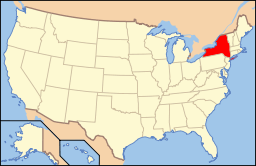Albright–Knox Art Gallery
|
Albright-Knox Art Gallery | |
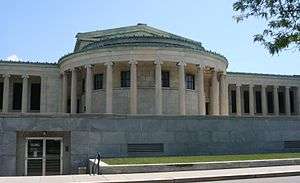 | |
| Location | 1285 Elmwood Avenue, Buffalo, New York |
|---|---|
| Coordinates | 42°55′57″N 78°52′32″W / 42.93245°N 78.87563°WCoordinates: 42°55′57″N 78°52′32″W / 42.93245°N 78.87563°W |
| Built | 1890-1905, 1962 (addition) |
| Architect | Augustus Saint Gaudens, Edward Brodhead Green[1] |
| Architectural style | Beaux arts[1] |
| NRHP Reference # | 71000538[1] |
| Added to NRHP | May 27, 1971 |
The Albright–Knox Art Gallery is an art museum located at 1285 Elmwood Avenue, Buffalo, New York in Delaware Park. The gallery is a major showplace for modern art and contemporary art. It is located directly across the street from Buffalo State College.
History

The parent organization of the Albright–Knox Art Gallery is the Buffalo Fine Arts Academy, founded in 1862. It is one of the oldest public arts institutions in the United States. In 1890, Buffalo entrepreneur and philanthropist, John J. Albright, a wealthy Buffalo industrialist, began the construction of the Albright Art Gallery for the Academy. The building was designed by prominent local architect Edward Brodhead Green. It was originally intended to be used as the Fine Arts Pavilion for the Pan-American Exposition in 1901, but delays in its construction caused it to remain uncompleted until 1905.[2]
In 1962, a new addition was made to the gallery through the contributions of Seymour H. Knox, Jr. and his family, and many other donors. At this time the museum was renamed the Albright–Knox Art Gallery. The new building was designed by Skidmore, Owings and Merrill architect Gordon Bunshaft, who is noted for the Lever House in New York City. The Albright–Knox Art Gallery is listed in the National Register of Historic Places.
The museum first began discussing a possible expansion in 2001. In 2012, the board commissioned the architectural firm Snøhetta to produce a master plan for future growth.[3] In 2014, the board voted to initiate a museum expansion and, in June 2016, the museum announced its selection of OMA as the architect for the project. Doubleline CEO and Buffalo native Jeffrey Gundlach has pledged $42.5 million to the project, while businesses, foundations, government groups, and individuals have promised matching funds toward a $125 million goal.
Exhibitions
In 1978, the Albright–Knox Art Gallery's exhibition on the work of Richard Diebenkorn was chosen to represent the United States at the 28th Venice Biennale. In 1988, the museum again won the competition to organize the exhibition representing the United States in Venice; the museum's curator Michael G. Auping proposed media artist Jenny Holzer.[4]
Collection

The Albright–Knox Art Gallery has long operated not by collecting artists’ work in depth but by trying to acquire key works.[5] The gallery's collection includes several pieces spanning art throughout the centuries. Impressionistic and Post-Impressionistic styles can be found in works by artists of the nineteenth century such as Paul Gauguin and Vincent van Gogh.
Revolutionary styles from the early twentieth century such as cubism, surrealism, constructivism are represented in works by artists like Pablo Picasso, Georges Braque, Jean Metzinger, Albert Gleizes, Henri Matisse, André Derain, Joan Miró, Piet Mondrian, and Alexander Rodchenko. Because of Seymour H. Knox and Gordon M. Smith, a former director, the Albright-Knox was one of the first museums to collect Abstract Expressionism in depth.[6]
More modern pieces showing styles of abstract expressionism, pop art, and art of the 1970s through the end of the century can also be found represented by artists such as Arshile Gorky, Jackson Pollock, Clyfford Still, and Andy Warhol. Additionally, the gallery is also very rich in various pieces of post-war American and European art;[7] their contemporary collection includes pieces by artists such as Kiki Smith, Allan Graham, Georg Baselitz, John Connell, and Per Kirkeby. The museum bought Anselm Kiefer's large-scale Die Milchstrasse (The Milkyway) (1985–87) in 1988 to celebrate its 125th anniversary.[8]
The Albright-Knox’s current exhibition space can accommodate only 200 works — just 3% of its 6,740-piece collection.[3]
Selected collection highlights
Paintings
 Honoré Daumier, Laundress on the Quai d'Anjou, c. 1860
Honoré Daumier, Laundress on the Quai d'Anjou, c. 1860 Jacques-Louis David, Portrait of Jacques-François Desmaisons, 1782
Jacques-Louis David, Portrait of Jacques-François Desmaisons, 1782 Robert Delaunay, Soleil, Tour, Aéroplane (Sun, Tower, Airplane), 1913
Robert Delaunay, Soleil, Tour, Aéroplane (Sun, Tower, Airplane), 1913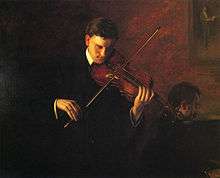 Thomas Eakins, Music, 1904
Thomas Eakins, Music, 1904 Thomas Gainsborough, Portrait of Miss Evans, c. 1786-1790
Thomas Gainsborough, Portrait of Miss Evans, c. 1786-1790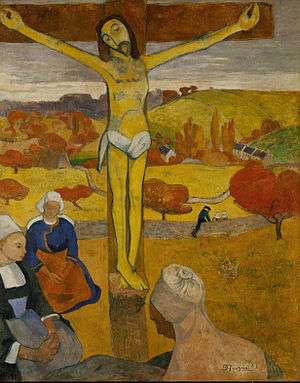 Paul Gauguin, The Yellow Christ, 1889
Paul Gauguin, The Yellow Christ, 1889

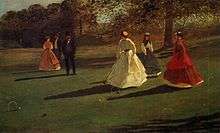 Winslow Homer, Croquet Players, 1865
Winslow Homer, Croquet Players, 1865 Jean Metzinger, 1912, Danseuse au café (Dancer in a café), oil on canvas, 146.1 x 114.3 cm. Exhibited at the 1912 Salon d'Automne
Jean Metzinger, 1912, Danseuse au café (Dancer in a café), oil on canvas, 146.1 x 114.3 cm. Exhibited at the 1912 Salon d'Automne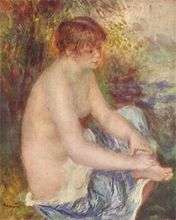 Pierre-Auguste Renoir, Small Nude in Blue, 1879
Pierre-Auguste Renoir, Small Nude in Blue, 1879 Joshua Reynolds Cupid as Link Boy, c. 1771-1777
Joshua Reynolds Cupid as Link Boy, c. 1771-1777 Henri Rousseau, Bouquet of Flowers with an Ivy Branch, 1909
Henri Rousseau, Bouquet of Flowers with an Ivy Branch, 1909 Alfred Sisley, Village Street in Marlotte, 1866
Alfred Sisley, Village Street in Marlotte, 1866 Vincent van Gogh, La Maison de la Crau (The Old Mill), 1888
Vincent van Gogh, La Maison de la Crau (The Old Mill), 1888
The Albright-Knox has more than 6,500 works in its collection, below is a list highlighting a few notable paintings:[9]
| Name | Artist | Year | Notes |
| Hotel Lobby | Max Beckmann | 1950 | |
| Music and Literature | William Michael Harnett | 1878 | |
| La Maison de la Crau (The Old Mill) | Vincent Van Gogh | 1888 | |
| Self-Portrait with Monkey | Frida Kahlo | 1938 | |
| La Jeune bonne (The Servant Girl) | Amedeo Modigliani | 1918 | |
| Nude Figure | Pablo Picasso | 1909-1910 | |
| La Toilette | Pablo Picasso | 1906 | |
| Chemin de haulage à argenteuil (tow path at argenteus) | Claude Monet | 1875 | |
| Convergence | Jackson Pollock | 1952 | |
| Orange and Yellow | Mark Rothko | 1956 | |
| Cow | Andy Warhol | 1976 |
Sculptures
The gallery contains a variety of sculptures on the exterior grounds. Some of the most notable, from the past and the present, include:
| Name | Artist | Year | Image |
| Alphabet Series | Fletcher Benton | N/A | |
| Big Red | James Rosati | 1971 | |
| Bond | Alexander Liberman | 1969 | |
| Stainless Steel, Aluminum, Monochrome I, Built to Live Anywhere, at Home Here | Nancy Rubins | 2011 |  |
| Cigarette | Tony Smith | 1961 | |
| Diamond I of III | Antoni Milkowski | 1967 | |
| Directional I | Lyman Kipp | 1962 | |
| Karma | Do-Ho Suh | 2010 | |
| E.C. Column | Kenneth Snelson | 1969–81 | |
| Flat Rate II | Lyman Kipp | 1969 | |
| Four Chances | Kenneth Snelson | 1982 | |
| Into the Blue | Shayne Dark | 2005 | |
| Laura | Jaume Plensa | 2012 | |
| Look and See | Jim Hodges | 2005 | |
| Shark Girl | Casey Riordan Millard | 2014 | |
| Stacked Revision Structure | Liam Gillick | 2005 | |
| The Cry | Isamu Noguchi | 1962 | |
| Turning the World Upside Down #4 | Anish Kapoor | 1998 |
Deaccessioning and the Albright-Knox's mission

In 2007, the Albright–Knox Art Gallery deaccessioned a Roman-era bronze sculpture, Artemis and the Stag, that was auctioned at Sotheby's New York on June 7, 2007, and brought $28.6 million.[10] This was the highest price ever paid at auction for an antiquity or a sculpture of any period, according to Sotheby's. It was purchased by the London dealer Giuseppe Eskenazi on behalf of a private European collector.[11]
The event brought national attention to what until then had been a local question, the mission of the Albright-Knox. In February 2007, when the list of works to be deaccessioned was made public, Albright-Knox Director Louis Grachos defined the ancient sculpture as falling outside the institution's historical "core mission" of "acquiring and exhibiting art of the present." This definition made public critics wonder whether the position at the Gallery of "William Hogarth's Lady's Last Stake or Sir Joshua Reynolds' Cupid as a Link Boy were secure. Works by Gustave Courbet, Honoré Daumier, Jacques-Louis David and Eugène Delacroix had been purchased by the museum in earlier decades.[12]
The decision to deaccession certain art works was made by a vote of the museum's Board of Directors, was voted on and ratified by the entire membership, and followed the guidelines of the American Alliance of Museums.[13] The sale raised questions about how museums can remain vital when they are situated in economically declining regions and have limited means for raising funds for operations and acquisitions.[14]
Hours
The gallery is open from 10 a.m. to 5 p.m., Tuesday through Sunday. On the first Friday of each month, the gallery is open from 10 a.m. to 10 p.m. with free admission to the permanent collection through the support of M&T Bank.[15]
Management

Governance
Since 2013, Janne Sirén has been director of the Albright–Knox Art Gallery. Sirén is believed to be the first director from the Nordic region to take the helm of a major American art museum.[16]
Complete list of directors:
- Janne Gallen-Kallela-Sirén (2013–present)
- Louis Grachos (2002-2013)
- Douglas C. Schultz (1983-2002)
- Robert T. Buck, Jr. (1973-1983)
- Gordon M. Smith (1955–1973)
- Edgar C. Schenck (1949–1955)
- Andrew C. Ritchie (1942–1949)
- Gordon B. Washburn (1931–1942)
- William M. Hekking (1925–1931)
- Cornelia Bentley Sage Quinton (1910–1924)
- Charles M. Kurtz (1905–1909)
Funding
As of 2007, the Albright–Knox Art Gallery's endowment stood at about $58 million, generating about $1.1 million a year for acquisitions.[5] Since the proceeds from the sale of some 200 works of art in 2007 were added to the preexisting $22 million acquisitions endowment, the museum has been able to spend as much as almost $5 million on new art annually.[17] In 2013, the Albright–Knox Art Gallery received an $11 million bequest from the estate of longtime board member and Buffalo arts patron Peggy Pierce Elfvin, possibly the largest single gift in the museum’s history.[18]
See also
References
- 1 2 3 "National Register of Historical Places - New York (NY), Erie County". National Register of Historic Places. National Park Service. 2007-02-24.
- ↑ "Cultural Resource Information System (CRIS)" (Searchable database). New York State Office of Parks, Recreation and Historic Preservation. Retrieved 2016-07-01. Note: This includes Diane S. Waite (September 1975). "National Register of Historic Places Registration Form: Albright–Knox Art Gallery" (PDF). Retrieved 2016-07-01. and Accompanying photographs
- 1 2 Julia Halperin (October 22, 2014), Buffalo’s jewel-box art museum to grow Archived 2014-10-23 at the Wayback Machine. The Buffalo News.
- ↑ Michael Brenson (July 27, 1988), Media Artist Named To Represent U.S. At '90 Venice Biennale New York Times.
- 1 2 Randy Kennedy (March 14, 2007), Buffalo’s Pain: Giving Up Old Art to Gain New New York Times.
- ↑ Michael Brenson (October 18, 1987), When America Put Its Stamp On World Painting New York Times.
- ↑ "History of Albright-Knox Art Gallery", Albrightknox.org Archived 2008-12-18 at the Wayback Machine., 23 September 2008
- ↑ Colin Dabkowski (August 24, 2013), Albright-Knox buys mammoth painting by German artist Anselm Kiefer The Buffalo News.
- ↑ "Collection Highlights". Albright-Knox Art Gallery. Retrieved April 6, 2012.
- ↑ "Artemis" fetches a staggering sum" The Buffalo News, 7 June 2007 Accessed 3 September 2008;
- ↑ "Albright-Knox rakes it in", Art In America, September 2007.
- ↑ Lee Rosenbaum, "Mission Creep: Albright-Knox Belatedly Releases Its Complete Deaccession List" Arts Journal
- ↑ "Archived copy". Archived from the original on February 1, 2010. Retrieved March 2, 2010.
- ↑ "Archived copy". Archived from the original on November 23, 2008. Retrieved March 2, 2010.
- ↑ "Hours & Admission". Albright–Knox Art Gallery. Retrieved August 6, 2016.
- ↑ Carol Vogel (January 14, 2013), Buffalo’s Albright-Knox Gets a Director from Much Farther North New York Times.
- ↑ Kevin West (November 2007), In With The New - With contemporary art booming out of control, how can museums afford to play? W.
- ↑ Colin Dabkowski (October 9, 2013), Albright-Knox gets $11 million bequest from ex-board member Peggy Pierce Elfvin Buffalo News.
External links
| Wikimedia Commons has media related to Albright-Knox Gallery. |
- Albright-Knox Art Gallery official homepage
- Buffalo Architecture and History: Albright-Knox Art Gallery, with photos and more detailed history


